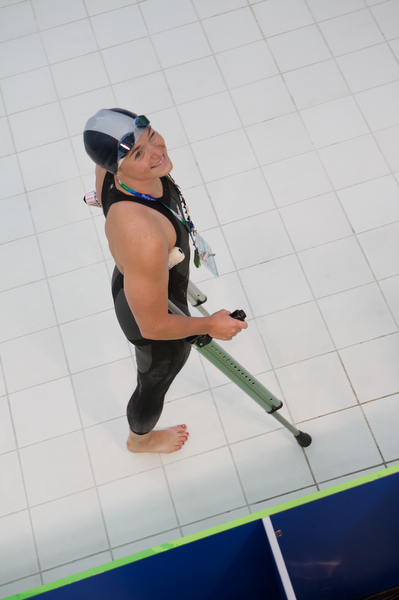Beijing Paralympics 2008
Featured Community Voice: Mimi Kuo-Deemer
Photographer Mimi Kuo-Deemer has traversed the globe taking pictures of women. It was in China, the site of the 2008 Beijing Olympics, where she saw women come together across nationalities, cultures and politics for the world's highest profile international sporting event. But for her, the most inspiring champions were not at the Olympic Games, but at the Paralympics, a counterpart sporting event for athletes with disabilities. On assignment to photograph U.S. Paralympic athlete and Iraq war veteran Melissa Stockwell, Mimi witnessed unity, strength and triumph through her camera lens. View a slideshow of her photography at the 2008 Beijing Paralympics.

View Larger >
Unity at the Olympics
Throughout the summer of 2008, the Olympic Games in Beijing provided an ideal platform for unity. Not only were so many athletes from across the world gathered in one place to compete together, but the whole planet watched events unfold in Beijing.
As a city, Beijing felt more unified and more cosmopolitan than ever. It impressed those who may not have known much previously. Spectators cheered everyone on, regardless of their nation or background.
Although nationalism in China was certainly at a high, there were no obvious signs of jealousy or rivalry among athletes or spectators. The best women athletes came together and competed in good spirits, as did the best male athletes.
On Assignment at the Paralympic Games
It was at the Paralympic Games, however, that I felt the sense of unity at its peak.
In September, 2008, I worked with a film crew to shoot photographs for the documentary From Baghdad to Beijing: 2008 Paralympic Games. The film follows three veterans of the Iraq war on their journey to become athletes in the Beijing 2008 Paralympic Games. One athlete I photographed was U.S. swimmer Melissa Stockwell.
Melissa became the first female amputee of the Iraq war after she lost her leg from a roadside bomb in April, 2004.
Although she had never swum competitively before, at the team trials leading up to the games, she qualified for the U.S. Paralympic team and even set a new American record.
Celebrating Achievement
The Paralympics were astounding to witness. It was impossible not to feel inspired by the athletes.
The games officially date back to 1976. They emphasize participants' athletic achievements rather than their disabilities. In the games I photographed, Melissa was one of 3,951 athletes from 143 countries competing in 20 sporting events.
A Crowd More Unified than Ever
The spirit of athletics here was as raw as at the Olympic events. The only difference was that many of these athletes had overcome odds generally thought to be impossible: they swam without limbs or without sight and they ran track events on one leg.
Even though crowds still cheered for their own country's team, borders became even less relevant. The crowds were proud just to witness the participants. Each athlete was competing against a peer who had shattered stereotypes and expectations to make it to Beijing.
Courage and Strength of Will
Melissa was no different. I believe these photographs convey Melissa's determination, courage, enthusiasm and strength of will as a woman and as an athlete. They show her pride in her country, but also her openness and happiness to be a participant as a Paralympian.
In an interview, she said she felt discouraged with her performance (she never advanced to the finals at the games), but she also said, "To be in Beijing is a dream come true."
I am honored to be able to share these photographs of her with a broader audience. I hope that in seeing these images of Melissa, with her athleticism and her ability, people will find the same inspiration that I have.
Mimi Kuo-Deemer's photographs appear in From Baghdad to Beijing: 2008 Paralympic Games, a documentary produced by 501 Film and featured in a New York Times story.

